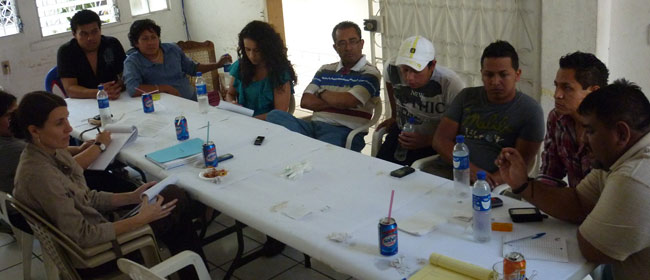
Allison Davenport ’04 and Maria Rosa Meza ’11 speak with advocates at Entre Amigos, the leading LGBT organization in El Salvador. (Photo courtesy Allison Davenport)
By Andrew Cohen
Students with Berkeley Law’s International Human Rights Law Clinic (IHRLC) have returned from a fact-finding mission to El Salvador, where they examined the difficult climate for the country’s LGBT and HIV-positive population.
During their six-day visit, Diya Malani ’11 and Maria Rosa Meza ’11 met with local advocates, public officials, and community members to document human rights abuses and identify gaps in legal protections for lesbian, gay, bisexual, transgender and HIV-positive Salvadorans. The students conducted hours of interviews and gathered legal documents and statistics.
“The advocates we met with all emphasized police brutality and harassment as major issues facing the LGBT community,” Malani said. “They also described the authorities’ indifference in responding to abuses suffered by this population.”
The students were supervised by IHRLC Clinical Instructor Allison Davenport ’04 and East Bay Community Law Center Staff Attorney and Clinical Instructor Linda Tam ’00. Findings from the trip will guide a new project with Salvadoran advocates, lawyers, and law students to provide pro bono legal services to LGBT and HIV-positive people. The findings will also be included in a forthcoming IHRLC report.
In addition to supporting efforts within El Salvador to coordinate legal education to the LGBT and HIV communities, the clinic hopes to help provide direct representation to individuals who have experienced rights violations. “It’s something the community desperately needs and has never had available,” Davenport said.
During one focus group session, participants told stories of harassment and discrimination—and cited significant barriers in getting health care, education, and employment.
The students found that El Salvador’s transgender population is particularly vulnerable. In 2009, 23 LGBT community members were reportedly murdered—the majority of them transgender women. “They can’t legally change their name or sex on official identification documents,” said Meza. “Every year, there are several murders of transgender individuals which receive only minimal investigation and never result in prosecutions.”
Tam said El Savador’s LBGT residents are greatly stigmatized, and that if they are also HIV-positive, they face heightened discrimination and “vulnerability to human rights abuses.”
Although HIV rates in El Salvador are comparable to other countries in the region, the HIV rate among men who have sex with men is the highest in Central America, at 18 percent. Among transgender people, it’s 25 percent.
Salvadoran law prohibits government health workers from discriminating based on a person’s HIV status, but there are widespread reports that it still occurs. “This discourages HIV-positive individuals from seeking needed medical treatment,” said Tam.
IHRLC students Danielle Kendrick ’12 and Megan Schuller ’11 have led the clinic’s research effort, analyzing El Salvador’s international and regional human rights obligations as well as its relevant domestic laws. One recent advance is Presidential Decree 56, signed by President Mauricio Funes in 2009, which prohibits discrimination by state employees based on sexual orientation or gender identity.
“While Decree 56 is a major step forward,” said Davenport, “it hasn’t been widely disseminated among public officials and public employees haven’t been trained to ensure its implementation. Significant gaps in the law and in enforcement remain.”